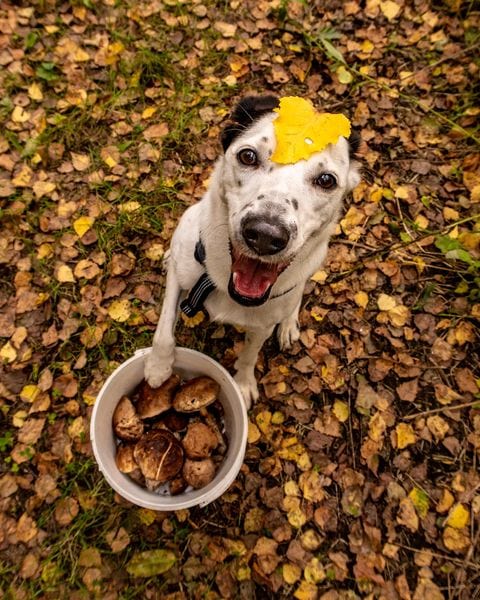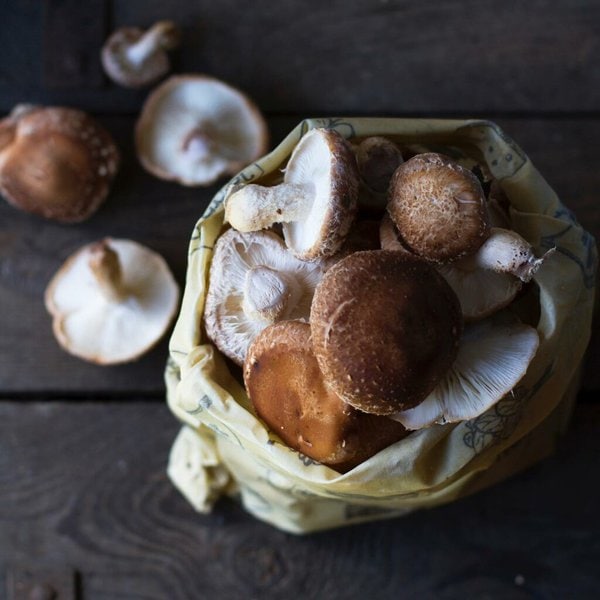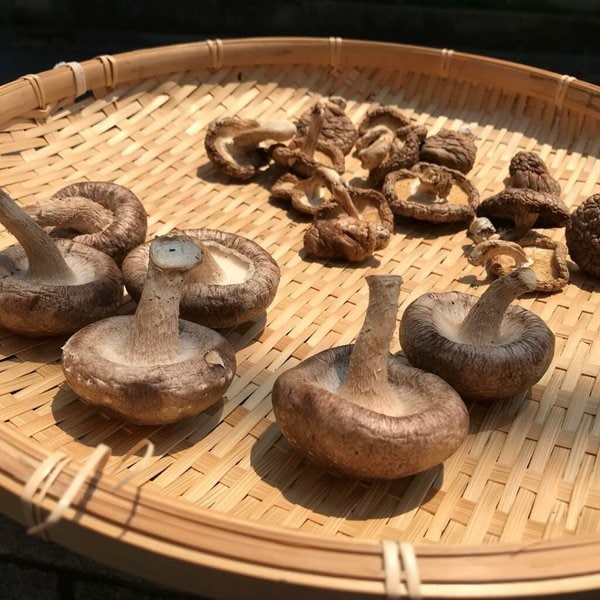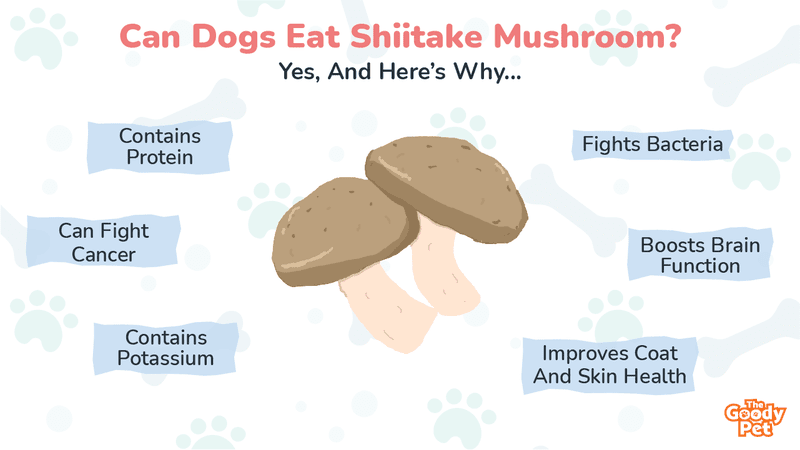Have you tasted shiitake mushrooms? If you haven’t, you’re missing a lot. When cooked, the fungi-veggie has a rich umami flavor and meaty texture and packs loads of valuable nutrients. You might wonder if your dog can also benefit from eating this mushroom. But can dogs eat shiitake?
Yes, dogs can eat shiitake mushrooms in moderation if you consider including them in your dog’s diet. Shiitake mushrooms are not toxic to dogs; if cooked, their rich nutritional value can be helpful to them in many ways. One notable benefit is that it greatly boosts your dog’s immune system due to its Lentinan content.
If you’re ready to try shiitake mushrooms in your furry friend’s diet, there are things to know before commencing. You will find this article helpful to your quest as it examines why including shiitake mushrooms in your furry friend’s diet is a great idea and how to do so safely.
Are Shiitake Mushrooms Safe For Dogs?

Yes, shiitake mushrooms are safe for dogs if they are well-cooked and served in appropriate quantities.
The mushroom is not among the wild varieties considered poisonous to humans and our canine friends. It also contains eritadenine, fiber, selenium, and other essential nutrients, which dogs should find advantageous to their overall health.
You can buy mushrooms as supplements from veterinary stores or as fresh produce from supermarkets and cook them yourself. Meanwhile, you must ensure not to add spices and other additives if you intend to serve your dogs from it.
What Is The Difference Between Mushrooms And Shiitake?
Shiitake mushrooms are edible mushrooms that belong to the Lentinula edodes species. The mushroom originates from East Asia, namely China and Japan, to be precise. Recently, it has been farmed in many parts of the world, including the United States.
Shiitake mushroom has the most intense woody flavor of any other kind of mushroom. You’ll also find it meatier and chewier than any other.
How To Prepare Shiitake Mushrooms For Dogs
How you prepare shiitake mushrooms for dogs depends on the form you obtained them in. You may purchase it dry, powdered, or fresh.
- Rehydrate the dried ones before cooking.
- Wash the shiitake mushrooms to rid them of germs
- Fry shiitake mushrooms in a frying pan and with little oil on medium heat till they are tender and golden brown.
- Turn it several times for it to cook evenly.
- Cut the cooked shiitake mushrooms into pieces and blend.
- Add in any of your dog’s food.
An alternative is to roast the mushroom. This method ensures you can keep most of the nutrients in the vegetable.
Why Is Shiitake Mushroom Good For Dogs?

Shiitake mushrooms are good for dogs because they are non-toxic and have antiviral, antibacterial, and antifungal properties, which are needed to enhance the health of canine friends.
Shiitake mushrooms are also high in nutrients, including the following:
- Vitamins B and D
- Proteins
- Copper
- Zinc
- Phosphorus
- Potassium
- Magnesium
- Selenium
In addition, it contains many enzymes, fiber, and essential fatty acids. You’ll also find them rich in the type of amino acids in meat! The advantages of feeding this mushroom variety to your dogs are as follows:
Supports Immune Function
Shiitake mushrooms are priceless for dog owners who want to boost their four-legged friend’s immune systems. The fungi contain immune-boosting ingredients like zinc, selenium, iron, protein, and copper.
Also, sun-dried shiitake is the best source of vitamin D, other than sunlight and egg yolk. When dogs eat these mushrooms, they stimulate the production of infection and disease-fighting cells. As a result, dogs are less likely to fall ill or pick up an infection when they take shiitake mushrooms.
Can Fight Cancer
Shiitake contains a glucohexose-based fungal beta-glucan (β-glucan) known as Lentinan. Research shows that this compound is effective against several different allogeneic and syngeneic tumors.
Lentinan achieves this effect by stimulating the secretion of a cancer-fighting protein known as alpha-interferon. By effect, eating shiitake mushrooms afford your dog a cheap way to avoid cancer and even inhibit the formation of leukemia cells.
Enhances Cardiovascular Health And Mobility
Shiitake mushrooms have a negligible amount of sodium and no saturated fats. These components are among the most notorious causes of cardiovascular problems.
Another way shiitake mushrooms can enhance cardiovascular health is that they are rich in β-glucans and eritadenine. Both elements are natural inhibitors of fat production, so your canine friend’s cholesterol production will drop in their presence. Eating this species of mushroom also controls their gut from absorbing cholesterol.
In addition, shiitake mushrooms have a moderate amount of potassium. The nutrient helps trigger the heart to squeeze blood through your dog’s body. Potassium in shiitake also aids muscles to move, nerves to work, and kidneys to filter blood efficiently.
Hence, senior dogs would benefit immensely from eating shiitake mushrooms since they are more prone to cardiovascular and mobility issues.
Improves Coat And Skin Health
Shiitake mushrooms contain selenium, an indispensable nutrient critical for increasing skin health, curbing dandruff and dry skin, and facilitating hair growth.
The minerals, selenium, and zinc in shiitake mushrooms help in rapid wound healing, so Fido’s skin is always smooth and free of sores. Such is the effectiveness of these mushrooms that many people use as a natural acne treatment.
As a result, eating shiitake mushrooms helps your furry friend improve their hair coat quality and preserve the softness and glow.
May Help Weight Management
If you want to maintain or reduce your dog’s weight, eating shiitake mushrooms can be beneficial. Shiitake is rich in fiber which can make dogs feel full after eating some. This means your canine friends wouldn’t eat as much as they normally would after taking the mushroom meal. It also helps them cut down tier food consumption, thereby keeping their weight in check.
Aids Digestion

Shiitake mushrooms are fiber-rich, and that helps to add mass to a dog’s poop, making bowel movement much easier. Again, the fungi-veggie contains β-glucans, which promote the growth and activity of the good bacteria in your furry friend’s intestines.
Furthermore, shiitake mushrooms have over 30 beneficial enzymes. Two notable ones are amylase, which is crucial for proper digestion, and cellulase, which is known as the fiber-dissolving enzyme.
With these many enzymes in shiitake, you wouldn’t have to worry about your Fido having flatulence and diarrhea issues.
Boosts Brain Function
Your dog’s brain requires high oxygen consumption and lipid-rich content. These factors make the organ most susceptible to oxidative stress. Thankfully, shiitake mushrooms are rich in antioxidants such as ergothioneine and selenium, making them the perfect nourishment to evade brain damage due to oxidative stress.
Again, shiitake mushroom is a credible source of brain-boosting vitamins, such as vitamins B6 and B9 (folic acid). A deficiency of these vitamins can lead to memory loss and other forms of cognitive degeneration as your pooch ages.
Fights Bacteria
Shiitake mushrooms have excellent antimicrobial properties. A study revealed that this fungi-vegetable inhibited production of 85% of the organisms tested with it. These test organisms included yeast and molds.
That means eating shiitake can stop the production of harmful bacteria in dogs’ bodies, making them less prone to diseases that arise from pathogenic infections.
Elder dogs would immensely benefit from eating shiitake since it can prevent the gum disease that often plagues canines of their age.
Can Dogs Eat Dried Shiitake Mushrooms?
Dogs cannot have dried shiitake mushrooms without cooking them. Health experts warn that adding dry shiitake mushrooms directly to dog food or licking it can cause skin conditions like severe itching.
Dogs can only have shiitake mushrooms after thoroughly cooking them to avoid skin conditions that may last for weeks.
Can Shiitake Mushrooms Be Poisonous?
Yes, shiitake mushrooms may be poisonous if taken raw or undercooked.
Feeding your furry friend raw or undercooked shiitake mushrooms can cause toxic “flagellate” dermatitis. While some dogs may take dry powdered shiitake mushrooms without any side effects, others may show signs of skin problems like intensive itching.
Also, be mindful of the quantity your dog takes. Start with small amounts and observe your furry friend for any signs of allergy or reaction. Meanwhile, dogs with blood disorders should not have shiitake mushrooms, no matter the quantity.
Can Mushrooms Cause Liver Damage In Dogs?

Yes, some species of mushrooms can cause acute liver failure, but shiitake mushrooms cannot.
Many mushroom types are toxic, and the one most notorious for causing acute liver failure is the Amanita phalloides.
Can Dogs Have Cooked Mushrooms?
Yes, dogs can have cooked mushrooms so long it is a healthy variety.
Even for edible mushrooms, dogs cannot eat them raw. Cooked mushrooms are the safest for dogs to eat. For cooking, you must ensure they are not undercooked to ensure it isn’t toxic. At the same time, overcooking them can also cause some nutrients in these vegetables to be lost.





